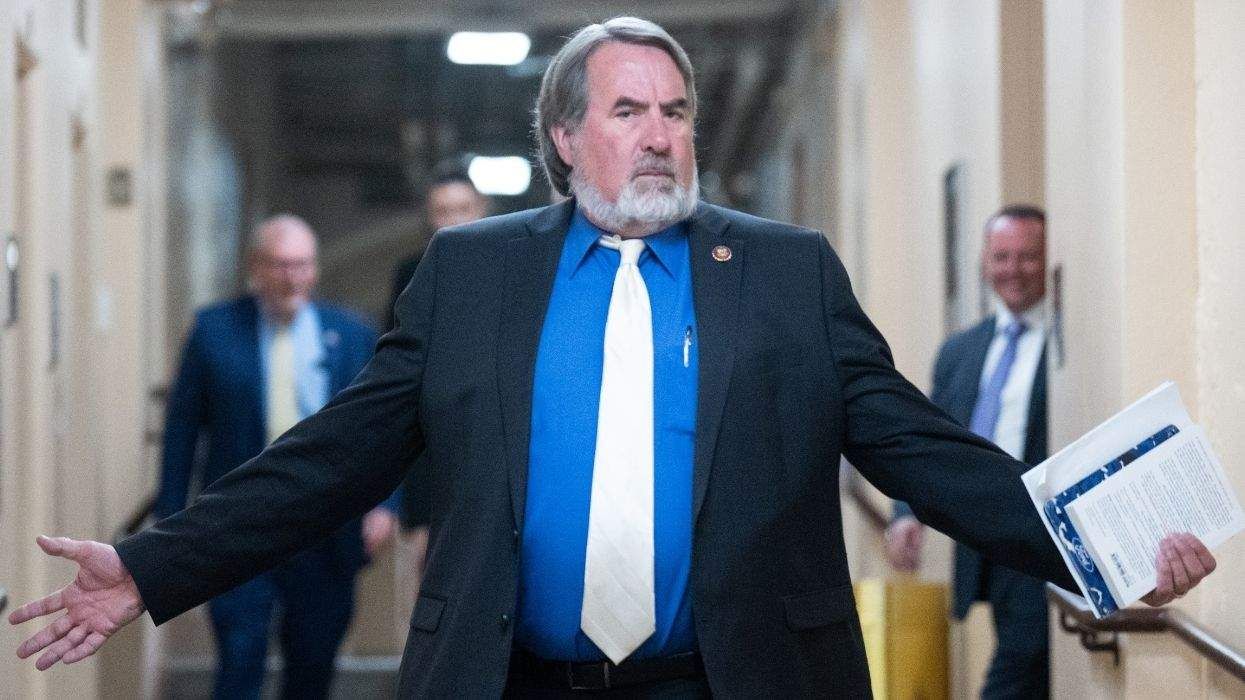Nothing says masculinity is in crisis like a chainsaw-wielding, 53-year-old billionaire strutting around on a stage shouting “This is the chainsaw for bureaucracy! Chainsaw!” like a man-child proudly playing with a toy in front of adults.
Keep up with the latest in LGBTQ+ news and politics. Sign up for The Advocate's email newsletter.
But is masculinity — the normative social roles, behaviors, and actions perceived as attributes of men — in crisis? Or is the crisis actually the steadily growing realization that masculinity is just spectacle? The simple donning of accoutrements — in Elon Musk’s case, a black MAGA hat (signifying white supremacy), gold chain (signifying toughness and wealth), and power tool (signifying working-class brawn) — to perform masculinity?
To put it otherwise: Is the chainsaw a chainsaw because of what it does? Or is it a chainsaw because Musk shouted “Chainsaw!” while holding it aloft?
Keep in mind: He did not turn it on or operate it during his performance on stage.
Even Musk understands the power of performance. “I am become meme,” he gleefully uttered after taking a seat to be interviewed by Newsmax host Rob Schmitt at CPAC late last month. “I’m living the meme. There’s living the dream and there’s living the meme and it’s pretty much what’s happening.”
Musk’s line is a callback to his own 2021 tweet that riffs off physicist Robert Oppenheimer’s quoting of the Bhagavad Gita after the detonation of the first atomic bomb (“Now I am become Death, the destroyer of worlds.”) Reflecting his brand of chaos, it is disconcertingly flippant commentary on how DOGE, his fake government department, has exacted very real power in decimating the government’s independent agencies that, in addition to essential social and administrative services, function as regulatory and accountability bodies to protect the American public.
Yet DOGE is a lot like masculinity: Its power lies in its performance, which exacts very real material consequences. It is, as his structural rhyme indicates, both a dream and a meme — there is no there there.
Memes, in fact, are the masculinity myth-making tools of choice for both Musk and his co-president Donald Trump on various social media platforms. They are conceived as superheroes, action heroes, progenitors of wealthy kingdoms, and emperors, among the variety of mythic male archetypes shared by them and fans alike.
Everyone knows these memes are preposterous — that is part of their pleasure to supportive audiences. We know Trump is not Superman or a god. Their authenticity, as literary critic Roland Barthes’ reminded us of the power of mythologies, is not relevant or essential to their public effect: At a time when “masculinity is in crisis” and powerful men cry about wanting “more masculine energy,” these memes present a clear and simple image of masculinity that gratify the status quo and particularly people desperate for traditional images of masculinity—where “men are men,” and where conservatives can be free from transgender butthole lasers.
What these memes as myths also do, to pull once again from Barthes, in effecting a simplified image of masculinity is to conceal all the messy and complicated social processes that comprise masculinity as we know it and experience it in the world. The masculinity, that is, which is “in crisis” because, again, there is no there there — masculinity is not natural or organic or a biological fact but the composite of social actions and behaviors in relation to a specific culture’s definition of manhood.
The so-called “crisis” is nothing short of the battle to define it, as evinced by the most recent musings of thought leaders in the manosphere. Is masculinity, as Meta CEO Mark Zuckerberg claimed earlier this year on Joe Rogan’s podcast, “aggression” that finds its expression in guy-friends “beating each other a bit”? Is it “adding surplus value” and “tak[ing] control of your life, be[ing] more action-oriented, [and being] more physically fit,” as podcaster and entrepreneur Scott Galloway said? Or is it, Galloway also asserted, realized through traditionally-coded feminine care work: “The ultimate expression of masculinity is that you can take care of yourself and take care of others.” And can masculinity be rescued and shored up by tanning your testicles, as Tucker Carlson believes?
The shifting sands of masculinity prove that it is socially created. “The style makes the man.” This centuries-old, popularized proverb presents a more poetic framing of the concept of social construction, the idea that our lives are largely defined by the negotiation of our desires and social conditions with social forces (such as societal norms, values, and structures), rather than predetermined by patriarchal scripts, whether religion or biology. Our self-stylization includes gender-affirming care—including the gender-affirming care like hair transplants, supplemental testosterone, and cosmetic surgery. In fact, according to a 2019 study, more breast reductions were performed on cisgender men than trans and gender diverse people.
Therefore, bigots decrying the “woke” agenda of self-determination need to espouse, for example, that gender is biological or god-given in order to maintain the heterosexist societal status quo. They enforce their beliefs through both legal and illegal means—what we’ve seen in abundance most recently, in the form of executive orders, proposed and passed legislation, and harassment and violence. The very existence of these myriad conservative efforts point to the fact that masculinity is not an irrefutable biological fact but a social construct. It becomes a spectacle through ideological desperation to soothe the wounded egos of fragile men.
Marcie Bianco, PhD, is a writer, editor, and cultural critic. She is the author of Breaking Free: The Lie of Equality and the Feminist Fight for Freedom.
Voices is dedicated to featuring a wide range of inspiring personal stories and impactful opinions from the LGBTQ+ community and its allies. Visit Advocate.com/submit to learn more about submission guidelines. Views expressed in Voices stories are those of the guest writers, columnists, and editors, and do not directly represent the views of The Advocate or our parent company, equalpride.















